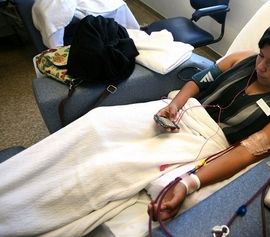
The measure, supported by the SEIU-UHW, is related to dialysis clinics
For three years, Ángel de los Santos has been a dialysis patient and attends a clinic very close to his home in South Los Angeles.
However, he is now concerned that the future of his health will be in the hands of the voters on November 3 as – he says – it could put his local clinic in check.
This is because of Proposition 23, funded by the Service Employees International Union-United Healthcare West (SEIU-UWD), which seeks to have dialysis clinics have a doctor on-site while treating patients.
In addition, it asks that infections that occur on the site be reported, that the consent of the state Department of Health be obtained before closing a clinic, and that patients not be discriminated based on the source of payment for the Attention.
Dhalia Ackerman, a registered nurse from Bakersfield, also said she was disappointed with the proposal because, she says, it could affect a clinic in the city of Arvin, located about 15 miles from Bakersfield, which serves low-income dialysis patients.
“This particular dialysis center would be a center that would probably close if the proposition passes,” he said.
He explains that by installing these doctors in dialysis places, the clinics would increase their expenses to pay for their salaries and that there would be no guarantee of a significant improvement in the quality of care since the doctors in that position can be from any specialty and not necessarily experts in kidney failure.
Those against the measure say the high costs could cause about half of the nearly 600 dialysis clinics in California to close their doors.
“I’m sad. It’s unfortunate that they use our battles of illness for their political issues, ”said De los Santos, who attends the Universal Park Dialysis Clinic at the intersection of Martin Luther King Jr. Boulevard and Figueroa Avenue.
For his part, Ackerman said most of the patients who come to Arvin’s clinic receive public assistance just like MediCal or Medicare.
If the centers cannot be maintained and are forced to close, the patients will lose the places of help near their homes.
“Closing this clinic means that patients are at risk of dying because they would have to travel 30 or 40 minutes to an hour to [recibir] their treatment ”.
He added that if the centers to which patients are going to travel are also affected, then they would have no choice but to end up in an emergency room.
The proposed changes are already in progress
Kathy Fairbanks, spokeswoman for the ‘No’ to the 23rd campaign, said some of the motion’s proposals are already being carried out today.
He explained that patient care in California is already highly regulated and that the requirement of the physician in dialysis centers would not improve patient care as this physician would not need to be a kidney specialist, nor have any special training in kidney dialysis or kidney health.
“It could be a dermatologist, it could be a podiatrist who fulfills this role,” he said. “However, it would be very expensive to the tune of around $ 320 million each year.”
As a result, small, independent and / or not-for-profit providers offering dialysis services may be left without the ability to absorb the expense causing their clinics to be cut or closed.
Regarding the request to report infections at the centers, Fairbanks said dialysis clinics are already required to report them to the federal government.
“They also have to report hospitalizations. That is why we say that it is a proposition that does not make sense ”.
According to the federal government, the Centers for Medicare and Medicaid Services – which regulate dialysis clinics – also posts quality scores in the lobby of each dialysis clinic.
As for the proposal to get state approval before a clinic can be closed, opponents say this would be illegal as the government cannot force them. [a mantenerse abiertos]”.
“The government could buy the clinics and keep them running, but it can’t force dialysis providers to keep the clinics open if they are running in the red.”
They consider the anti-discrimination requirement only a point that “sounds good to the voters” but that already exists.
There are discrepancies
Proposition 23 supporters say voting yes would primarily target multi-million dollar corporations such as DaVita and Fresenius, which monopolize the US dialysis market, and California – where they own 75% of the clinics.
“The average profit margin of dialysis clinics in California is almost four times that of the average hospital,” says Yesonprop23.com.
Steve Trossman, spokesman for ‘Yes’ on Proposition 23, said the initiative will have a profound effect on the Latino community.
According to the National Kidney Foundation, Hispanics are 1½ times more likely to have kidney failure than other Americans.
“Because of this, improve safety and care in dialysis centers, as the prop does. 23, is very important to the Latino community, ”Trossman said.
He added that the dialysis industry has raised more than $ 110 million to defeat Proposition 23, he says.
“They are willing to spend outrageous amounts of money because they want to keep every penny of the nearly 500 million earnings they make annually in California,” Trossman said.
“They see it as an investment, they spend $ 110 million to hold on to almost $ 466 million in profits they make from human misery and the suffering of dialysis patients.”






